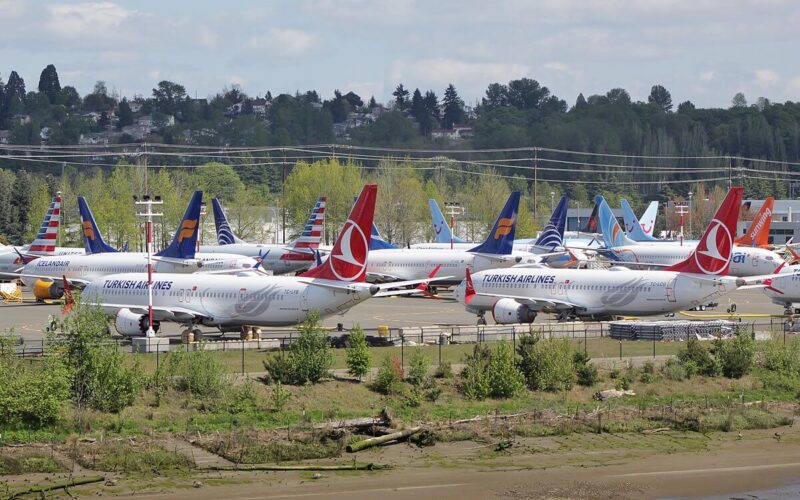The CEO of Boeing apologized to the families of the two 737 MAX crashes that killed 346 people in its first interview since the grounding. IATA does not expect to see the plane back in the sky for the upcoming 10 to 12 weeks. Meanwhile, compensation claims from airlines keep piling up.
The International Air Transport Association (IATA) does not expect the Boeing 737 MAX to take back to the skies “before 10 to 12 weeks”, way into the summer season.
During a press conference ahead of the IATA General Meeting in Seoul, Director General and CEO of the association Alexandre de Juniac said the aircraft would unlikely operate before August, based on “what [IATA] understand from the regulator”. This fits with what Dan Elwell, acting chief of the Federal Aviation Administration (FAA), told CNBC on May 23, 2019. Elwell expects for the process to take up to two months.
De Juniac added that the priority is now to “to restore confidence in the unique certification process, delivered by one authority and trusted with confidence by everyone else in the world”. This reciprocity system, which had prevailed until now, was damaged following suspicions of collusion between the FAA and Boeing during the certification process of the Boeing 737 MAX, something that is currently being investigated by the US Department of Justice. Once again, Elwell had expressed a similar concern, saying that “if [the other regulators] could lift the ban shortly after us, I think it would be good for the public’s trust”.
Another meeting between operators, regulators and aircraft manufacturers should be organized within 5 to 7 weeks for an update on “what has been done and what remains to be done”.
Boeing’s apology
In an exclusive interview to CBS, Boeing CEO Dennis Muilenburg apologized “personally” to the families of the victims of the Lion Air and Ethiopian Airlines crashes. He recognized the shortcomings of the manufacturer when it came to the MCAS: “We clearly fell short. The implementation of this angle of attack disagree alert was a mistake, we did not implement it properly”. In the weeks following the crash of Ethiopian Airlines, it was discovered that Boeing had made the alert feature optional, despite its importance for the safety of the aircraft.
During the Sanford C Bernstein Strategic Decisions Conference on May 29, 2019, Muilenburg defined the work to get the Boeing 737 MAX to operate again as a “clear and steady process”, and that the manufacturer was now in the process of applying for final certification.
However, he confessed that there was still substantial work to do. Moreover, once the plane will be recertified, Boeing expects for the delivery schedule to also be a long and tedious “individual customer-by-customer and individual airplane-by-airplane” process.
Piling up compensation claims
The China Air Transport Association (CATA) has estimated that the 13 companies of the country that were forced to ground their 737 MAX or saw their delivery delayed should suffer a loss of 4 billion yuan ($580 million), as reported by Bloomberg. The airlines, including Air China, China Eastern Airlines (CIAH) (CEA) and China Southern Airlines (ZNH) , have formally requested compensation from the manufacturer.
Another airline, in Europe this time, may have already secured compensations. The Irish Independent reported on May 24, 2019, that Ryanair obtained several millions of euros from Boeing, after the deliveries of its first five MAX were postponed to November 2019. Initially, the first aircraft was to be received in April 2019. Ryanair has an ongoing $22 billion contract for 135 MAX jets, with an option for 75 more.

